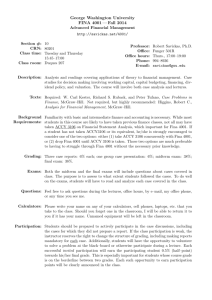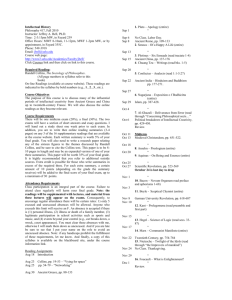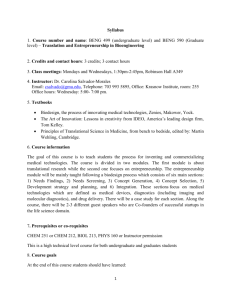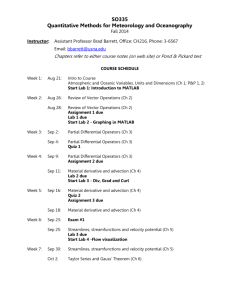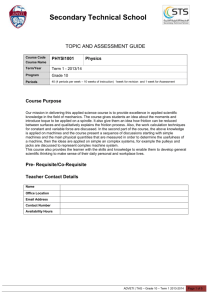George Washington University FINA 4001 — Fall 2015
advertisement
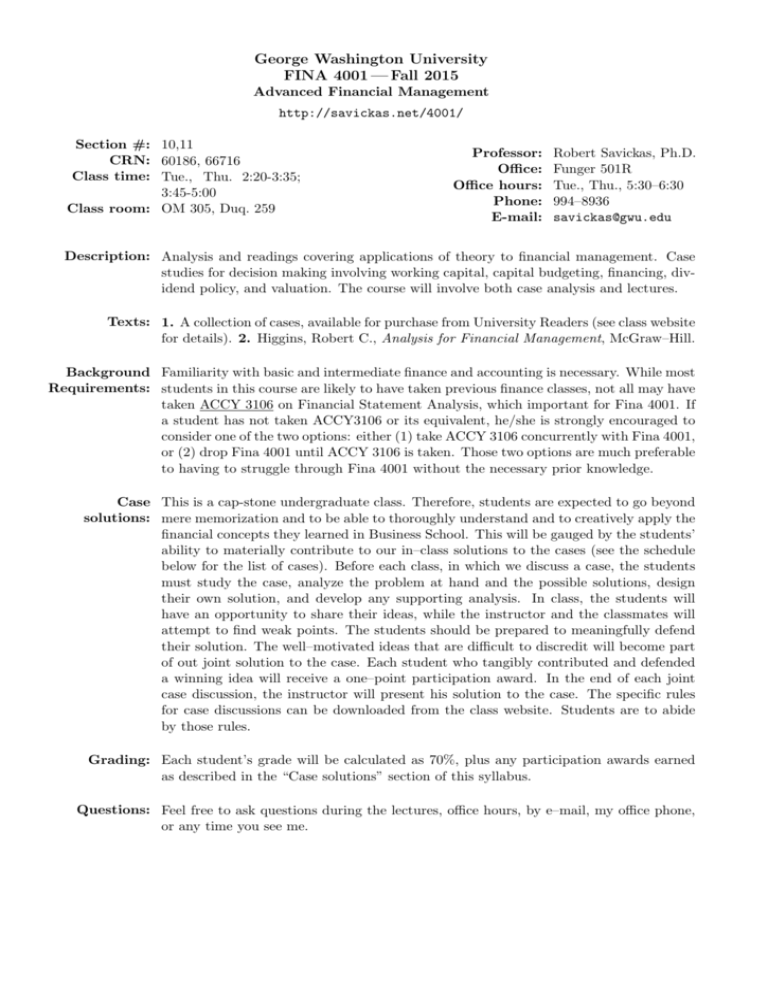
George Washington University FINA 4001 — Fall 2015 Advanced Financial Management http://savickas.net/4001/ Section #: 10,11 CRN: 60186, 66716 Class time: Tue., Thu. 2:20-3:35; 3:45-5:00 Class room: OM 305, Duq. 259 Professor: Office: Office hours: Phone: E-mail: Robert Savickas, Ph.D. Funger 501R Tue., Thu., 5:30–6:30 994–8936 savickas@gwu.edu Description: Analysis and readings covering applications of theory to financial management. Case studies for decision making involving working capital, capital budgeting, financing, dividend policy, and valuation. The course will involve both case analysis and lectures. Texts: 1. A collection of cases, available for purchase from University Readers (see class website for details). 2. Higgins, Robert C., Analysis for Financial Management, McGraw–Hill. Background Familiarity with basic and intermediate finance and accounting is necessary. While most Requirements: students in this course are likely to have taken previous finance classes, not all may have taken ACCY 3106 on Financial Statement Analysis, which important for Fina 4001. If a student has not taken ACCY3106 or its equivalent, he/she is strongly encouraged to consider one of the two options: either (1) take ACCY 3106 concurrently with Fina 4001, or (2) drop Fina 4001 until ACCY 3106 is taken. Those two options are much preferable to having to struggle through Fina 4001 without the necessary prior knowledge. Case This is a cap-stone undergraduate class. Therefore, students are expected to go beyond solutions: mere memorization and to be able to thoroughly understand and to creatively apply the financial concepts they learned in Business School. This will be gauged by the students’ ability to materially contribute to our in–class solutions to the cases (see the schedule below for the list of cases). Before each class, in which we discuss a case, the students must study the case, analyze the problem at hand and the possible solutions, design their own solution, and develop any supporting analysis. In class, the students will have an opportunity to share their ideas, while the instructor and the classmates will attempt to find weak points. The students should be prepared to meaningfully defend their solution. The well–motivated ideas that are difficult to discredit will become part of out joint solution to the case. Each student who tangibly contributed and defended a winning idea will receive a one–point participation award. In the end of each joint case discussion, the instructor will present his solution to the case. The specific rules for case discussions can be downloaded from the class website. Students are to abide by those rules. Grading: Each student’s grade will be calculated as 70%, plus any participation awards earned as described in the “Case solutions” section of this syllabus. Questions: Feel free to ask questions during the lectures, office hours, by e–mail, my office phone, or any time you see me. Web page: It will be students’ responsibility to check the class web page regularly (at least three times a week) using the URL (web address) given at the top of this syllabus. Important and time–sensitive information, announcements, dates, and hints will be posted there. Do not wait until the next class period to hear the news, as it may be old by that time. Note: this website is maintained by the instructor and is not in any way associated with the Prometheus or Blackboard, so please do not look for it there. E–mailing list: Students will be signed up for the mailing list for the class. This will allow the instructor to efficiently broadcast an important message to the entire class, answer a common question, and it will allow students to post any information/question that they want the rest of us to know/answer. Please let Savickas know if you are not receiving these communications. Attendance: Formal attendance will not be taken. Consent: A student’s staying in this class (as opposed to dropping it) indicates his/her understanding of and willingness to comply with all the terms listed in this syllabus. Schedule: In the table below, the chapters are from the book by Higgins. TBA = “to be announced.” Sep. 1: Introduction, Assessing Financial Health. Ch. 1, 2. Sep. 3: Assessing Financial Health. Ch. 1, 2. Sep. 8: Planning Financial Future. Ch. 3, 4. Sep. 10: Planning Financial Future. Ch. 3, 4. Sep. 15: The Body Shop case, presented by the instructor. Sep. 17: *Costco Wholesale, case A class analysis. Sep. 22: *Costco Wholesale, case A continued. Sep. 24: Savickas discusses in detail the Body Shop and Costco A case analyses. Sep. 29: *Costco Wholesale, case B class analysis. Oct. 1: *Costco Wholesale, case B continued. Oct. 6: *Home Store, Inc. case class analysis. Oct. 8: Financing/Capital Structure, Dividend Policy. Ch. 5, 6. Oct. 13: *Polaroid Corporation case class analysis. Oct. 15: *Goodyear Tire & Rubber case class analysis. Oct. 20: *Kelly Services, Inc. case class analysis. Oct. 22: *Jaguar and Land Rover case class analysis. Oct. 27: *Gainesboro Machine Tools case class analysis. Oct. 29: Derivatives Lecture. Ch. 5 Appendix. Nov. 3: *Flowers Industries, Inc. case class analysis. Nov. 5: *Financial Strategy at YPF case class analysis. Nov. 10: *Fisher & Paykel Industries case class analysis. Nov. 12: Cost of Capital, Valuation, and Discounted Cash Flows. Ch. 7, 8. Nov. 13: Duq. 651 Cost of Capital, Valuation, and Discounted Cash Flows. Ch. 7, 8. Nov. 17: *MCI Communications Corp. case A class analysis. Nov. 19: *The Boeing 777 case class analysis. Dec. 1: *Valuing Wal-Mart case class analysis. Dec. 3: *Baidu.com, Inc. case class analysis. Dec. 8: *Lululemon Athletica case class analysis. *Students should be prepared to take part in solving this case together in class.
